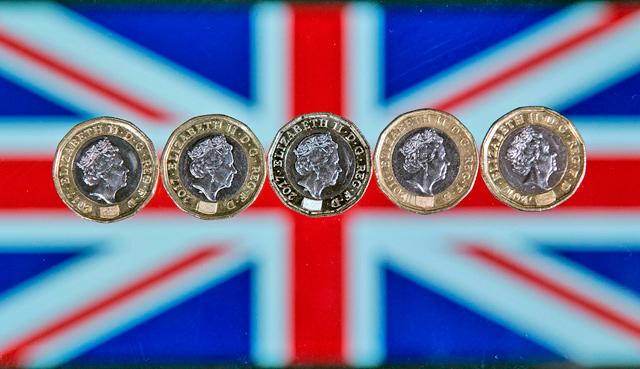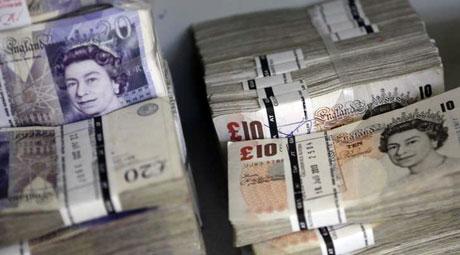You are here
Sterling gains as Britain, EU seal Brexit transition deal
By Thomson Reuters Foundation - Mar 19,2018 - Last updated at Mar 19,2018

British one pound sterling coins are arranged in front of a Union flag for a photograph in London on December 14, 2017 (AFP file photo)
LONDON — Sterling surged on Monday as Britain and the European Union agreed to a 21-month post-Brexit transition period and a potential solution to avoid a "hard border" for Northern Ireland.
The pound, which had already been rallying on expectations for a transition deal, gained further after British Brexit Minister David Davis and EU chief negotiator Michel Barnier announced an agreement.
Investors had largely expected Britain to secure an agreement at Thursday's EU summit, but concern remained that a deadlock over the Irish border would derail a deal.
Securing the terms of a transition phase — which will last to the end of 2020 — was vital, because it means London and Brussels can now focus on what sort of trading relationship the two sides will have after Britain leaves the EU next year.
Against the dollar the pound rose as much as 1 per cent to $1.4088, its strongest since February 16 and the biggest one-day rise since January, before falling back. It was up 0.6 per cent at $1.4031 at 16:00 GMT.
Versus the euro, sterling climbed as much as 0.8 per cent to 87.455 pence per euro, its best level since February 8.
The yield on two-year British government bonds — which is most sensitive to Bank of England (BoE) interest rate decisions — hit a new high since the June, 2016 Brexit referendum.
"We think sterling can go up to $1.44 which could mean that in terms of euro-pound you could get two big figures to the downside," Hans Redeker, global head of currency strategy at Morgan Stanley, told Reuters.
"I think this week you will have the BoE preparing for a May rate hike, which is not a big surprise...But it's happening in a context when other factors are also playing in favour of sterling — the relationship with Europe and momentum coming into the negotiations on Brexit."
Sterling faces a crucial week, with the BoE announcing an interest rate decision on Thursday after inflation and wages data is published. It is expected to keep rates on hold but to prepare the market for a possible increase in May, a rise it had signalled as contingent on a transition agreement.
Business leaders echoed a warning from Barnier that the deal will only be legally binding if London ratifies the whole withdrawal treaty by March.
Analysts do not expect the BoE to serve up any surprises on Thursday, but will be looking at both consumer inflation data, due on Tuesday, and wage data due on Wednesday for any sign of inflationary pressures building in the economy.
Viraj Patel at ING said the pound could rise as high as $1.43 this week if economic data also supported sterling and the BoE sounded more hawkish than expected.
Sterling has been among the best performing major currencies since it slumped after the Brexit vote in 2016. It hit a post-Brexit vote high of $1.4346 in January.
"Despite modest growth and moderating inflation, the BoE is likely to reiterate its intention to gradually raise rates as it sees limited slack in the economy," UBS analysts told clients.
"Now that a transition deal has been tentatively agreed, it may motivate more hawkish language from the BoE."
UBS said sterling could rally as far as 85 cents per euro.
Related Articles
LONDON — Sterling climbed above $1.39 on Thursday for the first time since Britain's vote to leave the European Union and was on track for a
LONDON — Sterling slipped to a seven-week low against the dollar on Thursday, as investors sold the pound on worries a Brexit transiti
LONDON — Sterling gave up all its earlier gains and was flat on the day thanks to a broad rebound in the dollar though hawkish comments from














